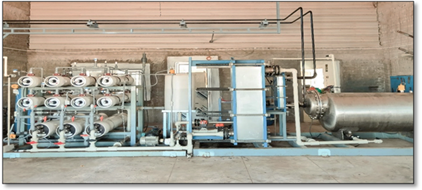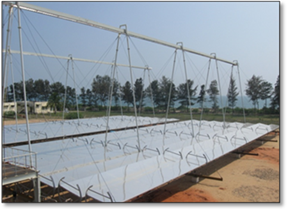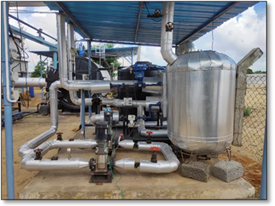Narippaiyur, a village in Ramanathapuram District, a drought prone area situated in the South-East corner of Tamil Nadu will benefit from 20,000 litres per day of fresh water produced from sea water – thanks to the solar thermal Forward Osmosis (FO) sea water desalination system installed in the place.
The customized demand driven convergent water solution through FO will supply two litres of good quality drinking water per person per day for 10,000 people in the village, successfully overcoming a major drinking water shortage in the village. The FO system facilitates high recovery, low energy consumption, potential for resource recovery, especially in solutions of high osmotic pressure, less fouling of the membrane because of low pressure operation, easier and more effective cleaning of the membrane, longer membrane life and lower operating costs.
Tamil Nadu IIT Madras in collaboration with Empereal – KGDS Renewable Energy have successfully established and demonstrated this system to address prevalent and emerging water challenges in Mission Mode in the village.
Ramanathapuram District, situated in the South-East corner of Tamil Nadu, is severely affected by scarcity of potable water due to salinity, brackishness and also poor sources of ground water. The district of 423000 hectares has a long coastal line measuring about 265 kilometres accounting for nearly 1/4th of the total length of the coastal line of the state.
The Water Technology Initiative, Department of Science & Technology (DST) has supported this field based effort in the district through the consortium members led by Indian Institute of Technology Madras (IITM), KGiSL Institute of Technology (KITE), Empereal– KGDS Renewable Energy (P) and ICT Mumbai.

Forward Osmosis system installed at Narippaiyur Village, Ramanathapuram District, Tamil Nadu


LFR based Solar Thermal System Solar hot water system installed at Narippaiyur Village, Ramanathapuram District, Tamil Nadu
The sea water FO technology operates at near 2 bar pressure unlike sea water RO that operates at 50 bar pressure. It is versatile, has high energy efficiency and low operation and maintenance costs compared to other technologies.
The produced water will be supplied to the local people with the support of villagers and panchayat. This initiative of DST can pave way for scaling up the emerging technology in various coastal rural areas of the country to address drinking water shortage.
You may also like
-
Dot Simplifies Approval Processes For Telecom Licenses And Wireless Equipment
-
PM to Inaugurate SEMICON India 2024 on 11th September
-
Shri Piyush Goyal Sets 500 Million Tonnes Domestic Steel Production Target by 2034
-
NHAI to Track Around 100 Toll Plazas with GIS-Based Software for Seamless Movement of Traffic at National Highways
-
“Marching Towards Building A Digitally Connected Bharat and An Atmanirbhar Telecom Sector”: Union Minister Jyotiraditya Scindia
